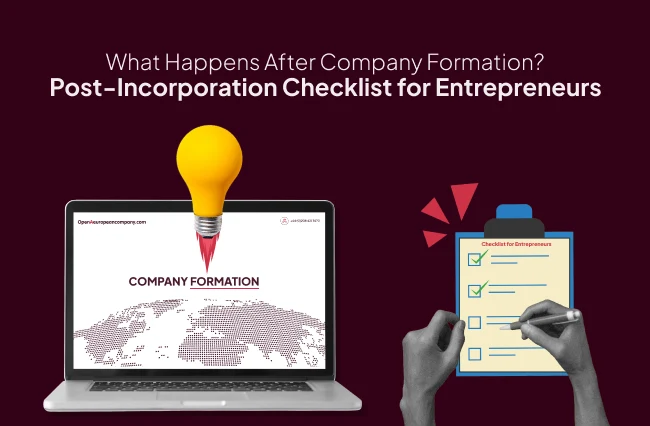What Happens After Company Formation? Post-Incorporation Checklist for Entrepreneurs

Forming a company is a monumental first step in launching your business, but it’s only the beginning. Once the incorporation documents are signed and approved, many entrepreneurs wonder what comes next. This guide outlines the critical steps to follow in incorporating your Post Company Formation checklist, ensuring you are legally compliant, financially prepared, and operationally sound. Whether you’ve worked with a European Company Formation Agent or gone through the process yourself, understanding these next steps will help solidify your foundation and pave the way for success in the European and global markets.
| Step | Key Action |
|---|---|
| Documents | Store Certificate, Articles, Share Register |
| Tax Registration | Apply for Tax ID, VAT |
| Bank Account | Open business account, consider fintech |
| Company Officers | Appoint directors, define share structure |
| Payroll Setup | Register as employer, setup payroll |
| Accounting | Use tools like Xero or QuickBooks |
| Compliance | Track filings, submit returns on time |
| Brand Identity | Launch website, domain, email, logo |
Obtain Company Documents and Store Them Safely
After incorporation, you will receive essential documentation from your country’s company registrar. These include:
- Certificate of Incorporation: This proves your business is officially registered.
- Memorandum and Articles of Association: Outlines your company’s structure and operating rules.
- Share Certificates and Statutory Registers: Required for shareholder and legal recordkeeping.
Store both digital and physical copies securely. These documents are crucial for opening bank accounts, securing investments, and registering for taxes.
Register for Taxes and Obtain a Tax ID
Every business is required to register with the tax authorities. In the UK, this means obtaining a UTR (Unique Taxpayer Reference); in the U.S., an EIN (Employer Identification Number). In Europe, similar identifiers apply depending on jurisdiction. You will need this ID to file corporate tax returns, manage VAT obligations, and comply with national tax legislation. Registration timelines vary, but most countries require completion within 30 days of incorporation to avoid penalties.
Also consider:
- VAT/GST registration if your turnover exceeds the national threshold.
- Corporate tax registration to avoid penalties.
Registering for taxes is a non-negotiable step in your Post Company Formation journey and sets the groundwork for long-term compliance and credibility with government bodies and financial institutions.
Set Up a Business Bank Account
One of the first operational tasks after incorporation is to open a dedicated business bank account, which separates personal and corporate finances. Opening a corporate bank account is crucial for effective financial management. You’ll need:
- Certificate of Incorporation
- Proof of identity and address for directors
- Company address and tax registration
Choose between traditional banks and fintech solutions that offer multi-currency accounts, an excellent option for businesses setting up in Europe and handling international clients. Some fintech platforms also integrate with accounting tools like Xero or QuickBooks, streamlining cash flow and expense tracking. Consider your transaction volume, currency needs, and location preferences when selecting a provider. Many European banks now offer remote onboarding options, which are particularly beneficial for non-resident entrepreneurs. Always compare account fees, online banking features, and available financial services to match your business goals.
Appoint Company Officers and Define Share Structure
You must formally appoint directors, secretaries, and other officers. Make these appointments official by filing them with Companies House or your national registrar.
Additionally:
- Allocate shares to the founding members
- Maintain a Share Register
- Draft Shareholders’ Agreements to clarify roles and rights
These steps provide transparency and protect your business in the event of disputes. Appointing the right individuals ensures effective governance. Clear documentation of roles also strengthens investor confidence and is often a legal requirement when opening bank accounts or securing business insurance. Maintaining updated officer records is essential for annual filings and corporate compliance.
Register for Payroll and Social Security (if hiring)
Once you start building a team, it’s essential to register your business for payroll and social contributions right away. If you plan to employ staff, register as an employer with the tax office.
- Get your Employer PAYE reference
- Set up payroll systems
- Register for social security and pension contributions
These registrations ensure you remain compliant and avoid fines or litigation. Additionally, you must file Real Time Information (RTI) with every payroll run in jurisdictions like the UK. Choosing payroll software that integrates with your accounting system can simplify reporting and deductions. If you’re expanding across borders, ensure you understand the employment laws in each country, and consider a common area where partnering with a European company formation agent can streamline compliance. Proper payroll setup also enhances employee satisfaction and trust, especially in remote and hybrid teams.
Set Up Accounting Systems and Bookkeeping
As your operations begin, setting up a reliable accounting system should be one of your top priorities. Accounting is key to financial health and transparency. Consider:
- Software like Xero, QuickBooks, or FreeAgent
- Hiring a professional accountant or outsourcing
- Setting up expense tracking and audit logs
Recordkeeping is legally required and supports investor due diligence and tax compliance. Maintaining accurate books also enables timely financial forecasting and budgeting, which are essential for sustainable growth. If you’re managing a Business Setup Europe operation, adopting cloud-based accounting can help you consolidate reporting across jurisdictions.
Moreover, many local tax authorities require digital submissions, so selecting Making Tax Digital (MTD)-compatible tools is essential for long-term compliance. Working with an expert accountant ensures you’re claiming all available deductions and incentives, such as R&D credits or VAT refunds.
Apply for Licenses, Permits, and Business Insurance
Once your company is officially registered, the next crucial step is ensuring it operates legally within your chosen industry and jurisdiction. Regulations vary by industry. Common licenses include:
- Food and beverage licenses
- Financial service authorisations
- Import/export permits
Also, protect your business with insurance:
- Public liability
- Employer’s liability
- Professional indemnity
Confirm local requirements through your European Company Formation Agent or legal advisor, particularly when operating across multiple EU member states. Specific sectors, such as healthcare, real estate, or fintech, may require specific national approvals, and compliance with EU-wide directives, including the GDPR and PSD2, may also be applicable. Early registration ensures you avoid costly delays, regulatory breaches, or operational halts. Many post-company formation issues stem from incomplete licensing, so it’s wise to seek early legal counsel and map your business model to applicable permits and policies.
Draft Internal Agreements and Legal Documents
Your business must formalise internal governance with documents like:
- Shareholder agreements
- Director contracts
- Employee NDAs and contracts
- Client and supplier T&Cs
These contracts mitigate risk and ensure clarity among stakeholders. Robust documentation becomes especially important when scaling, attracting investors, or entering joint ventures. Working with a trusted European Company Formation Agent or legal professional ensures these agreements comply with local laws and reflect your company’s strategic goals.
Build Your Business Identity
A professional image builds credibility. Begin with:
- Registering a domain name
- Setting up branded email addresses
- Launching a website and business social media pages
- Designing a logo and visual identity
Consider trademarking your brand to protect intellectual property, especially in cross-border markets. A strong and cohesive brand presence fosters trust with clients, partners, and investors from the outset.
Develop an Operational Plan
Now that your company exists, plan how it will operate.
- Define workflows (sales, delivery, support)
- Use tools like Trello, Asana, or CRM platforms
- Create an organisation chart
This step is essential for scaling efficiently. An operational blueprint ensures that roles are clearly defined and processes run smoothly. Regularly reviewing and optimising your plan will help you adapt to market changes and drive long-term growth.
Prepare for Compliance and Annual Filings
Your responsibilities don’t end with incorporation. Stay compliant by:
- Marking calendar dates for annual returns
- Scheduling confirmation statements
- Filing corporate tax returns
Missing deadlines can lead to fines, reputational harm, or even dissolution. Automate reminders using compliance software or enlist the help of an accountant to manage deadlines. Staying ahead of these requirements builds trust with investors, regulators, and stakeholders.
Seek Professional Support and Build a Network
Success doesn’t happen in isolation. Surround yourself with:
- Accountants and legal advisors
- Business mentors or coaches
- Memberships in chambers of commerce or industry groups
These resources help you stay compliant, scale wisely, and make informed decisions. Networking also opens doors to partnerships, funding opportunities, and new markets. Establishing early relationships with trusted professionals lays the foundation for sustainable growth.
Conclusion
The road doesn’t end once you’ve incorporated; in fact, it’s only just begun. A well-planned post-company formation strategy ensures compliance with local laws, establishes credibility, and lays the groundwork for long-term success. By following this comprehensive checklist, from securing documents and registering for taxes to building your brand and ensuring compliance, you can confidently focus on growing your venture. Whether you’re launching in a single market or going global, being proactive today avoids complications tomorrow. If you’re planning a business setup in Europe, these steps apply across jurisdictions.
The post What Happens After Company Formation? Post-Incorporation Checklist for Entrepreneurs appeared first on Open a European Company.


















































